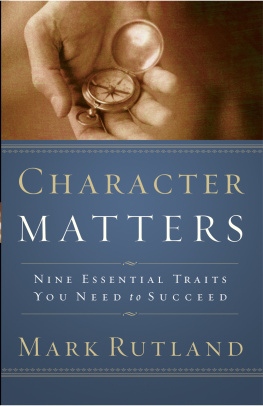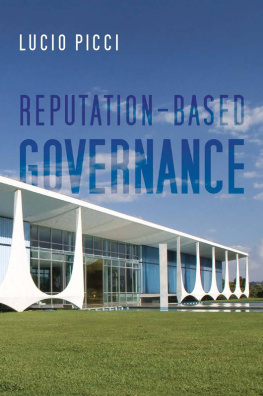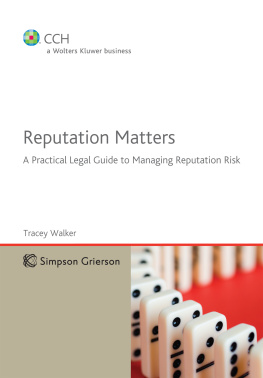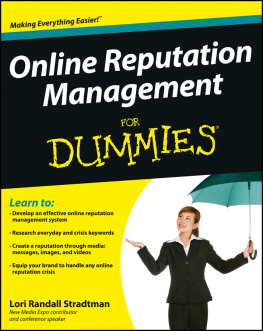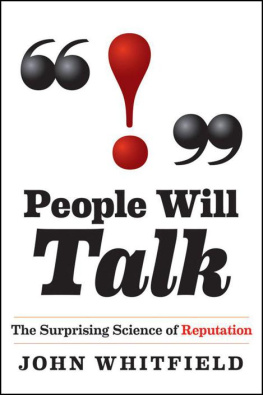Origgi - Reputation: what it is and why it matters
Here you can read online Origgi - Reputation: what it is and why it matters full text of the book (entire story) in english for free. Download pdf and epub, get meaning, cover and reviews about this ebook. year: 2018, publisher: Princeton University Press, genre: Religion. Description of the work, (preface) as well as reviews are available. Best literature library LitArk.com created for fans of good reading and offers a wide selection of genres:
Romance novel
Science fiction
Adventure
Detective
Science
History
Home and family
Prose
Art
Politics
Computer
Non-fiction
Religion
Business
Children
Humor
Choose a favorite category and find really read worthwhile books. Enjoy immersion in the world of imagination, feel the emotions of the characters or learn something new for yourself, make an fascinating discovery.
Reputation: what it is and why it matters: summary, description and annotation
We offer to read an annotation, description, summary or preface (depends on what the author of the book "Reputation: what it is and why it matters" wrote himself). If you haven't found the necessary information about the book — write in the comments, we will try to find it.
Origgi: author's other books
Who wrote Reputation: what it is and why it matters? Find out the surname, the name of the author of the book and a list of all author's works by series.
Reputation: what it is and why it matters — read online for free the complete book (whole text) full work
Below is the text of the book, divided by pages. System saving the place of the last page read, allows you to conveniently read the book "Reputation: what it is and why it matters" online for free, without having to search again every time where you left off. Put a bookmark, and you can go to the page where you finished reading at any time.
Font size:
Interval:
Bookmark:

REPUTATION
Reputation
What It Is and Why It Matters
Gloria Origgi
Translated by Stephen Holmes and Noga Arikha
PRINCETON UNIVERSITY PRESS
PRINCETON AND OXFORD
Copyright 2018 by Princeton University Press
Requests for permission to reproduce material from this work should be sent to Permissions, Princeton University Press
Published by Princeton University Press,
41 William Street, Princeton, New Jersey 08540
In the United Kingdom: Princeton University Press, 6 Oxford Street, Woodstock, Oxfordshire OX20 1TR
press.princeton.edu
Jacket design by Michael Boland for thebolanddesignco.com
All Rights Reserved
Originally published as La rputation, qui dit quoi de qui
copyright Presses Universitaires de France
Excerpt from Choruses from The Rock from Collected Poems, 19091962 by T. S. Eliot. Copyright 1936 by Houghton Mifflin Harcourt Publishing Company. Copyright renewed 1964 by Thomas Stearns Eliot. Reprinted by permission of Houghton Mifflin Harcourt Publishing Company and Faber and Faber Ltd.
All rights reserved.
ISBN 978-0-691-17535-5
Library of Congress Control Number 2017953503
British Library Cataloging-in-Publication Data is available
This book has been composed in Adobe Text Pro and Gotham
Printed on acid-free paper.
Printed in the United States of America
10 9 8 7 6 5 4 3 2 1
CONTENTS
PREFACE TO THE ENGLISH EDITION
Reputation, reputation, reputation! Oh, I have lost my reputation! I have lost the immortal part of myself, and what remains is bestial.
OTHELLO, ACT 2, SCENE 3
Dismayed at having lost Othellos favor, Cassio repeats the word reputation three times. Reputations spread uncontrollably, are echoed back and forth, and reproduce themselves in the voices of others. This is why the immortal part of ourselves is also the most fragile and elusive. Iago, who secretly manipulates Cassios reputation in order to destroy him, answers cynically that we should not worry about our reputations because they do not depend on us. Although we are constantly seeking to assure ourselves of the favorable opinion of others, our personal merit often has nothing to do with why we gain or lose our coveted good name.
Reputation is shrouded in mystery. The reasons it waxes or wanes and the criteria that define it as good or bad often appear fortuitous and arbitrary. Yet reputation is also ubiquitous. On the one hand, we care intensely about the opinion of others, sometimes to the point of committing irrational acts in a bootless effort to determine how others see us. On the other hand, we rely on reputation to guide our choice of doctors, newspapers, websites, and even ideas. It seems to insinuate itself into the most intimate recesses of our existence.
This book tries to explain why reputation is so important, personally and socially, as well as how it circulates, how it is transformed and distorted, and how it affects what others say about us. The book raises two fundamental philosophical questions about reputation. First: Can reputation be considered a rational motivation for action? What drives us to defend or improve or repair our reputation? And second: Can reputation be considered a rational justification in the acquisition of information? When, on the basis of reputation, we choose a doctor or a bottle of wine or adopt a point of view are we acting in a rational way?
In searching for answers to these theoretical questions, I have immersed myself in a variety of heterogeneous literatures, spanning virtually all the social sciences. The result is a distinctly kaleidoscopic, not to say eclectic, approach to the topic. By piecing together the fragmentary and partial treatments of reputation that I have discovered in various social science disciplines (sociology, economics, anthropology, cognitive science, linguistics, and so forth), I have tried to give shape and substance to a highly elusive concept. The result is not a full-scale theory of reputation of the sort philosophers might ideally aspire to produce. It is something more modest, namely a theoretical analysis of the concept of reputation that I have anatomized and reconstructed with an eye on the various mechanisms that govern its functioning. In this sense, the book remains eminently philosophical. I have endeavored to make the conceptual analysis it contains somewhat less sterile by incorporating the findings of social science, as is proper in my own philosophical subdiscipline, social epistemology. Nor have I hesitated to make my theoretical arguments more vivid and comprehensible by the frequent resort to concrete examples drawn from imaginative literature and everyday life.
Admittedly, the methodological eclecticism of the following pages may try the patience of readers who feel more comfortable with theorizing that keeps within well-demarcated disciplinary boundaries. Moving from Proust to economic sociology or from Jane Austen to signaling theory may seem like an unnecessary form of mental gymnastics. It makes your head spin, but does it really take you anywhere?
Readers will judge. But I am convinced that the interdisciplinary approach taken in this book is an effective way of making philosophy into a fruitful discipline, in touch with the burning issues of our times and capable of contributing to the understanding and interpretation of the present by using all the conceptual tools that other sciences (as well as art and literature) make available.
This freedom to roam freely among various fields of knowledge, it should probably be said, is to some extent the result of my personal trajectory. An Italian who immigrated to France where I became immersed in Anglo-Saxon philosophy, I have spent my life straying across intellectual and disciplinary boundaries, often erected and defended by local prejudice and snobbery. My interest in reputation is also a side effect of this passion for trespassing.
It is also worth mentioning that the book before you is replete with quotes from a heterogeneous array of disciplinary cultures and countries. This deliberate pluralism of cited sources reflects my conviction that there is no one objective ranking of intellectual quality. It is only by accepting the cognitive diversity and cultural complexity of our world that we can come to see old problems with new eyes.
fundamental social and cognitive competence whose functioning I analyze and attempt to explain.
is devoted to the theoretical approaches to reputation developed in the different branches of social science that adopt the theory of rational choice. The principal questions addressed are: Can reputation be seen as a rational strategy? And is it a means to other ends or an end in itself?
deals with the communicative aspect of reputation, that is, how it circulates and through which social and linguistic mechanisms it can be stabilized. This is an important question because sometimes a reputation can be ephemeral while at other times it seems set in stone. Gossip, rumors, and informational cascades contribute to the background noise that characterizes the universal human discussion of who did what to whom.
introduces a set of tools from the social sciences, including social capital theory, the theory of networks, and the sociology of hierarchies, to understand how the mechanisms designed to evaluate reputations function and what makes them reliable.
contains a critical analysis of our faith in experts and a presentation of the many biases that influence and distort our perception of the reputation of others.
the economy of esteem defended by Geoffrey Brennan and Philip Pettit and Anthony Appiahs theory of honor.
Next pageFont size:
Interval:
Bookmark:
Similar books «Reputation: what it is and why it matters»
Look at similar books to Reputation: what it is and why it matters. We have selected literature similar in name and meaning in the hope of providing readers with more options to find new, interesting, not yet read works.
Discussion, reviews of the book Reputation: what it is and why it matters and just readers' own opinions. Leave your comments, write what you think about the work, its meaning or the main characters. Specify what exactly you liked and what you didn't like, and why you think so.




